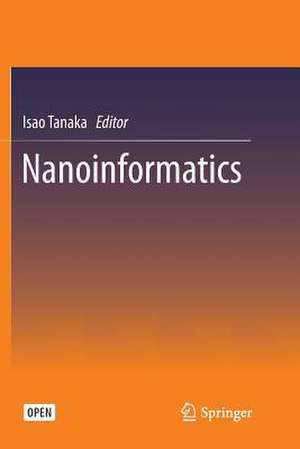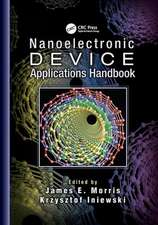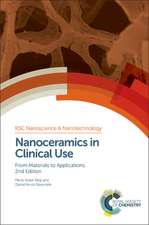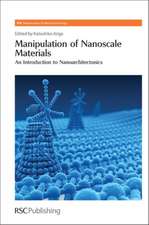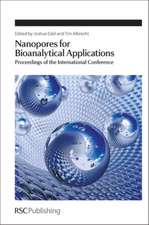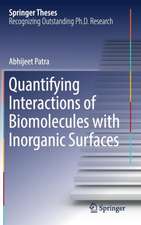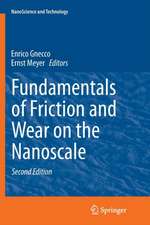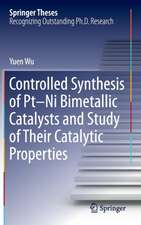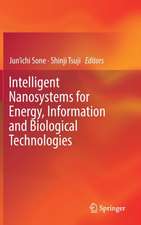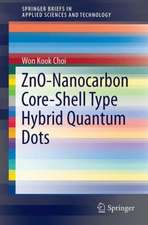Nanoinformatics
Editat de Isao Tanakaen Limba Engleză Paperback – 4 ian 2019
| Toate formatele și edițiile | Preț | Express |
|---|---|---|
| Paperback (1) | 422.11 lei 6-8 săpt. | |
| Springer Nature Singapore – 4 ian 2019 | 422.11 lei 6-8 săpt. | |
| Hardback (1) | 429.44 lei 6-8 săpt. | |
| Springer Nature Singapore – 24 ian 2018 | 429.44 lei 6-8 săpt. |
Preț: 422.11 lei
Nou
Puncte Express: 633
Preț estimativ în valută:
80.80€ • 87.79$ • 67.91£
80.80€ • 87.79$ • 67.91£
Carte tipărită la comandă
Livrare economică 21 aprilie-05 mai
Preluare comenzi: 021 569.72.76
Specificații
ISBN-13: 9789811356612
ISBN-10: 9811356610
Pagini: 298
Ilustrații: VIII, 298 p. 188 illus., 142 illus. in color.
Dimensiuni: 155 x 235 mm
Greutate: 0.44 kg
Ediția:Softcover reprint of the original 1st ed. 2018
Editura: Springer Nature Singapore
Colecția Springer
Locul publicării:Singapore, Singapore
ISBN-10: 9811356610
Pagini: 298
Ilustrații: VIII, 298 p. 188 illus., 142 illus. in color.
Dimensiuni: 155 x 235 mm
Greutate: 0.44 kg
Ediția:Softcover reprint of the original 1st ed. 2018
Editura: Springer Nature Singapore
Colecția Springer
Locul publicării:Singapore, Singapore
Cuprins
1. Descriptors for Machine Learning of Materials Data.- 2. Potential Energy Surface Mapping of Charge Carriers in Ionic Conductors Based on a Gaussian Process Model.- 3. Machine learning predictions of factors affecting the activity of heterogeneous metal catalysts.- 4. Machine Learning-based Experimental Design in Materials Science.- 5. Persistent homology and materials informatics.- 6. Polyhedron and Polychoron codes for describing Atomic Arrangements.- 7. Topological Data Analysis for the Characterization of Atomic Scale Morphology from Atom Probe Tomography Images.- 8. Atomic-scale nanostructures by advanced electron microscopy and informatics.- 9. High spatial resolution hyperspectral imaging with machine-learning techniques.- 10. Fabrication, Characterization, and Modulation of Functional Nanolayers.- 11. Grain Boundary Engineering of Alumina Ceramics.- 12. Structural relaxation of oxide compounds from the high-pressurephase.-13.Synthesis and structures of novel solid-state electrolytes.
Notă biografică
Isao TANAKA is a professor in the Department of Materials Science and Engineering at Kyoto University in Japan. He has joint appointments as a director of the Center for Elements Strategy Initiative for Structural Materials (ESISM), Kyoto University, Japan, a senior chief researcher of Japan Fine Ceramics Center (JFCC), Nagoya, Japan, and in the Center for Materials Research by Information Integration (MI2I), NIMS, Japan. He is also the leader of a Grant-In-Aid Project of Scientific Research on Innovative Areas of JSPS, Japan on “Nanoinformatics” (2014-2018) with eight other Pis in multiple institutes.
His research area covers first principles theory and experiments in the field of inorganic materials science. He got international awards including Philip Franz von Siebold Prize from German Government in 2008 and Richard M. Fulrath Award from American Ceramics Society in 2004. He is an associate editor of the Journal of American Ceramics Society. He is author and coauthor of 364 papers mostly in highly prestigious journals which have gotten totally 8247 citations (h-index 42).
Textul de pe ultima copertă
This open access book brings out the state of the art on how informatics-based tools are used and expected to be used in nanomaterials research. There has been great progress in the area in which “big-data” generated by experiments or computations are fully utilized to accelerate discovery of new materials, key factors, and design rules. Data-intensive approaches play indispensable roles in advanced materials characterization. "Materials informatics" is the central paradigm in the new trend. "Nanoinformatics" is its essential subset, which focuses on nanostructures of materials such as surfaces, interfaces, dopants, and point defects, playing a critical role in determining materials properties. There have been significant advances in experimental and computational techniques to characterize individual atoms in nanostructures and to gain quantitative information. The collaboration of researchers in materials science and information science is growing actively and is creating a new trendin materials science and engineering.
This book is open access under a CC BY license.
Caracteristici
Enables readers to learn the state of the art of the emerging research area efficiently Will keenly interest theorists and experimentalists in both the academic and industry sectors Presents interdisciplinary research subjects suitable for future collaborations
